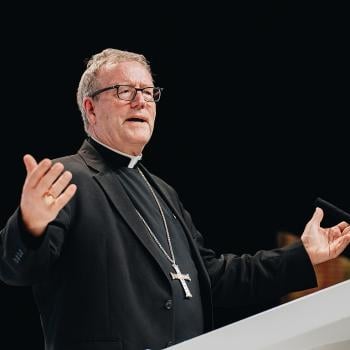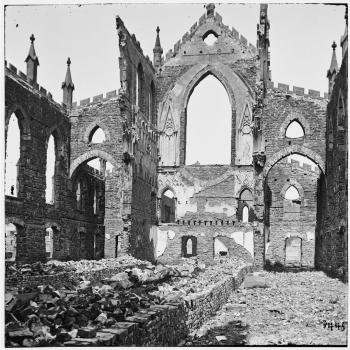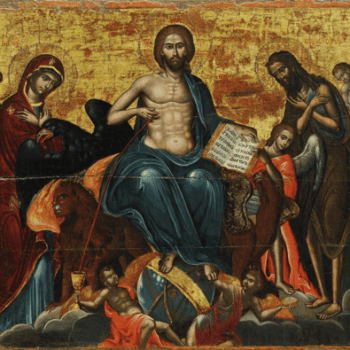
Lately, the United States Conference of Catholic Bishops (USCCB) has been very disappointing in its actions, especially in regards the ways its leadership has worked to undermines its programs for the poor, peace, and social justice. Yes, there is more to the faith than being a charitable organization, but faith without works is dead. Scripture not only calls us to be concerned for the poor, for those who are suffering at the hands of structures of sin in society, but to work for dismantling those structures and bring relief to those who are in need.
Justice and charity are both intimately connected to the work of Christ, for Christ became one of the poor, joined himself in solidarity with them, in order to promote and lift them up. God gives them blessings and if we want to enjoy those blessings, we should also join ourselves with the plight of the poor and the oppressed. To do so takes time and resources, something which the USCCB previously supplied. Sadly, it now seems that the leadership of the USCCB is not interested in that; instead, they want to promote performative piety (such as the recent use of eucharistic processions, which is not to say eucharistic processions by their nature are bad, but like many pious devotions, can be used badly) and various extreme right-wing ideological political concerns, trying to have the eucharist itself associated with and point to those right wing ideological positions rather than traditional Catholic sensibilities (which often resisted those ideological positions).
Nothing seems to represent this better than what is happening with the Tenth National Eucharistic Congress. At the time when Pope Francis was trying to help reorient the church’s engagement with the world, turning it into a positive force in it, making sure it authentically engages its social teachings and their implications, the USCCB decided to regulate such concerns to the periphery so that it can promote its own ideological initiatives. They used the Eucharist Congress to do this. They suggested that the Congress was needed because too many Catholics fail to understand the church’s eucharistic teachings because one badly executed survey suggested American Catholics no longer believed in the real presence. They embraced that survey to justify themselves, ignoring why many were critical of the way it was conducted as well as the fact that other surveys came to a far different conclusion (that is, American Catholics had not lost faith in the real presence of Christ in the eucharist).
Thus, it appears the need for the Congress was based upon a false assumption, one which could have been, and was, easily shown to be false. Why would the USCCB do that? Again, it seems to me, the Congress was established so that the USCCB can create a distraction from what Pope Francis was doing and teaching. Some, at least, wanted to undermine the Pope because his interests are radically different from their ideological interests. This is why it seems that the Congress works to continue the politicization of the eucharist in the United States. Many from the right, including those with leadership positions in USCCB, have been trying to find any excuse they can use to deny Democratic politicians (and those who vote for them) from receiving communion (ignoring the Pope, who has denounced such politicization of the eucharist). Their reasoning, of course, tends to be inconsistent, for they claim such Democratic politicians deny authoritative Catholic teaching, justifying exclusion from communion, while ignoring right-wing politicians who do the same thing (and far worse), such as when William Barr actively sought to use the death penalty as much as was possible while he was Attorney General (despite the way the church has come to declare the death penalty is inadmissible). The USCCB wanted to create the notion of a “eucharistic coherence,” and yet, they themselves demonstrate no real coherence.
I have seen the way the USCCB and others have defended the Eucharistic Congress: those who questioned it, or the emphasis being embraced by it, are accused of denying the church’s eucharistic doctrines. Time and time again, we are told the Congress is necessary to help deal with the lack of belief in the real presence (which, not only, is not true, I really have not seen much which they have said or done which really reaches out to those Catholics who have questions about the Catholic teaching). Time and time again we are being warned that the eucharist is being defiled by those who receive it and who are not worthy of its reception (ignoring the fact that no one is worthy, it is a gift, and as a gift, it works for the healing of body and soul). What we are not told is the way the eucharist, the body of Christ, and the real presence of Christ in the eucharist, connects to the presence of Christ in the poor and needy. We are not told the relation between communion and social justice. We are not shown how the eucharist connects us to the whole world, and with it, our obligation to serve it as Christ served it (such as working for its preservation). We are not given a proper notion of eucharistic coherence; rather, we are given a pseudo-coherence, one which is reinforced by their pomp and circumstance (and the triumphalism which comes out of pomp and circumstances).
It seems to me that the USCCB and the Eucharistic Congress are reinforcing the worst instincts of American Catholicism instead of working for a proper eucharistic revival. They should be shown the way communion should lead them to look beyond themselves, their personal preferences, so that they can be open to and united with Christ’s interests. Then, when they do so, they would find themselves with Christ in the poor, working for them, helping to alleviate their exploitation.
My disappointment with the USCCB and the way it has promoted the eucharist, the way it has discussed the eucharist, often in ways which commodify the eucharist or treat it as a magical talisman, has led me to write on those issues I saw were being ignored, for by doing so, I hope to help present a fuller, better understanding of the eucharist than the one promoted by various forms of popular piety.
What I believe best exemplifies the problems surrounding the Eucharistic Congress, and its interests, lies in the fact it is expensive, both to have it convened, but also for Catholics to participate in it. This shows how far away the Congress is from the way of Christ, the one is in the eucharist. Christ is with the poor, even as he warned the rich what would happen if and when they alienate the poor. The Congress does not seem to be embracing the poor Christ but rather the rich and powerful whom Christ warned. Indeed, this can be seen in the way it is careless of the needs of the people – why do have promote and sell a special beer made for the participants to buy and consume while ignoring the fact many of them are potential alcoholics who need help, helps which some want to provide and yet find the Congress itself ignore?
The USCCB said it does not have the funds to help the poor, but, like so many who embrace the right, they have the funds to make a special party for the rich. Jesus said we are not to show off our piety, to bring out all the trumpets to bring attention to ourselves; the USCCB would do well to keep that in mind when they see, far from helping inspire Catholics, their actions only lead more to question the state of Catholicism in the United States.
Stay in touch! Like A Little Bit of Nothing on Facebook.
If you liked what you read, please consider sharing it with your friends and family!
N.B.: While I read comments to moderate them, I rarely respond to them. If I don’t respond to your comment directly, don’t assume I am unthankful for it. I appreciate it. But I want readers to feel free to ask questions, and hopefully, dialogue with each other. I have shared what I wanted to say, though some responses will get a brief reply by me, or, if I find it interesting and something I can engage fully, as the foundation for another post. I have had many posts inspired or improved upon thanks to my readers.













